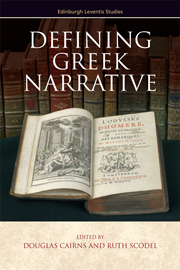1 - Introduction
Published online by Cambridge University Press: 05 September 2014
Summary
Behind this volume lies the hope that we will someday achieve a general view of the history of ancient Greek narrative (henceforth, for simplicity, often ‘Greek narrative’) – that is, that we will be able to present a meaningful narrative about how the practices of telling stories developed within Greek literature, and that this history will contribute to the understanding of both Greek literature and narrative generally. Before anyone can write a history, however, the historian needs to be certain that the field has been meaningfully defined, both temporally and spatially. A narrative requires a beginning and an end, and a historical narrative also requires a decision about what the subject is. These decisions will determine much of the history itself, and the choice of boundaries is difficult and ideologically weighted.
While the ideological implications of literary history are sometimes less obvious than those of the histories of nations, they are very real, and the boundary difficulties present themselves immediately. Originality conveys literary value, and literary value can be important for a nation's symbolic capital: this volume began as a conference in Edinburgh, with its monuments to Robert Burns and Sir Walter Scott nearby. There can be few cities where the significance of the cultural and literary inheritance, and its interactions with power and national identity, are so manifest.
- Type
- Chapter
- Information
- Defining Greek Narrative , pp. 1 - 10Publisher: Edinburgh University PressPrint publication year: 2014



